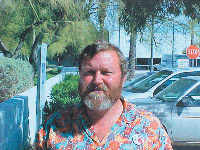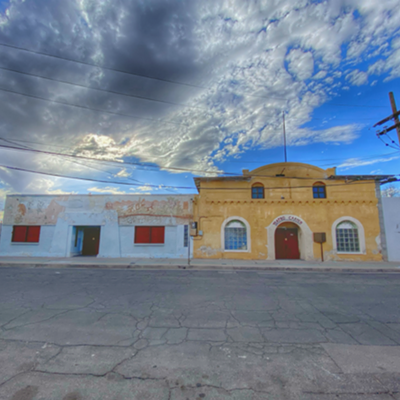McHenry and a crew of roughly 30 protestors enacted a mock war crimes tribunal on a makeshift stage as traffic raced south on Oracle Road through the Ina Road intersection.
A dozen picketers waved signs opposing military action in Iraq while a black-robed prosecutor charged Kyl, George Bush, Dick Cheney, Defense Secretary Donald Rumsfeld, U.S. Sen. John McCain and Congressman Jim Kolbe with violating international law. The actors playing the various officials--a woman with a "Bush" sign around her neck sported a bolo tie, cowboy hat and giant plastic ears--offered defenses involving oil companies, arms merchants and big-biz profits. A small crew of videographers captured the proceedings for later telecast on public-access cable.
The jury didn't take long to come back with a verdict. In less than half an hour, the cast read through the script on a fuzzy sound system, pronounced the Republicans guilty and packed up to head for lunch at Wild Oats supermarket.
Although no audience appeared outside of the media, a handful of drivers rolling down Oracle Road honked, flashed peace signals or suggested the protestors "fuck off."
"This is a little more than a mock trial," says McHenry, 45. "There's a lot of debate now in the international legal community about really indicting Bush for crimes against humanity and really bringing him to justice at the Hague. This was an illegal war."
Following the verdict, Kyl spokesman Matt Latimer released a statement that said that the Republican senator "respects very much the right of individuals to express their viewpoints. This is a freedom we take for granted in America--one, incidentally, that was punishable by death in Saddam Hussein's Iraq.
"The careful efforts undertaken by U.S. military personnel to avoid civilian casualties while freeing Iraqis from a brutal regime speaks for itself," the statement continued. "So does the outpouring of joy we've seen from Iraqi citizens who actually endured this regime's cruelty firsthand."
But Americans should not be fooled by those images, according to McHenry, a founder of the anti-war group Food Not Bombs. "It did not show a diversity of opinion about how people in Baghdad really feel about regime change and about the war," he explains. "People are not overall necessarily satisfied with this regime change."
McHenry's spin is tough sell these days, with polls showing that four out of five Americans now support the war. He concedes that collapse of Saddam has slowed the movement's momentum. The only other protest over the weekend was an anti-war dance.
"Not many people showed up for that," McHenry says.
But he predicts activists will regroup, particularly once the war widens to Syria and Iran. In fact, he's already printing up "Stop the War in Syria" bumper stickers to stay ahead of the curve.
"My sense, from talking from people, is that they just so horrified by what they're seeing in Iraq now that it just seems hopeless," says McHenry. "It's as brutal, if not more brutal, than what we've been predicting all along. This is the worst-case scenario for all people on earth. So I think people are disheartened that the United States could violate these people's rights so dramatically."
McHenry is even more disgusted with his fellow Americans' celebration over the collapse of Saddam's regime.
"It's like Americans don't even get what they've done," McHenry says. "It's astounding that we live in a nation of essentially completely ignorant vicious, violent thugs that have no respect for human life. It's very frightening.
"If you've lived anywhere else or been anywhere else, you realize just how bankrupt this society is," he adds. "That's what gets me. Americans think they're so smart and stuff, but they don't know anything about history. They don't know anything about political science. It's got to be one of the most ignorant groups of people in the world. It blows my mind."
He's given up on U.S. media, saying he has to find the truth in the foreign press. Many of his friends are leaving the country for Canada, Mexico and Europe.
"If you read back to the time period with Hitler, we're at the same state," McHenry says. "Except for worse, in that these guys in power now already have bases in 126 countries and they have obviously such an overwhelming military that they can destroy just about anything, and they also have such little regard for human life."
The current state of affairs has McHenry waxing nostalgic about life behind the Iron Curtain during the Cold War. He says a friend in Prague recently burned himself to death to protest the current state of affairs in that country. Before the Berlin Wall fell, his friend had been imprisoned for speaking out against the communist regime, but he didn't know how good he had it, especially once he had a chance to compare his life there to the United States, according to McHenry.
"It was clear that neither regime was actually ultimately any more honest, democratic or fair than the other," says McHenry. "The only difference was in the Czech Republic, everyone had health care and everyone had an education and everyone's needs were always met.
"But he did not have freedom of speech in Prague," McHenry says, "and we do not have freedom of speech here in the United States."








